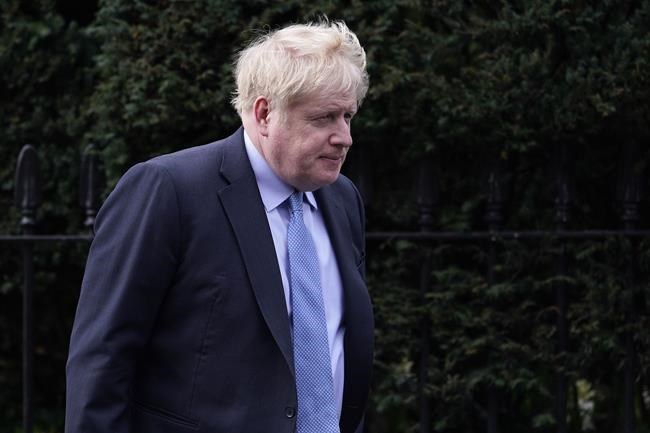LONDON (AP) — As Britain’s prime minister, Boris Johnson established an independent public inquiry into his government’s handling of the COVID-19 pandemic.
Now the inquiry wants to see, in full, what Johnson wrote to other U.K. officials as the outbreak raged — but the government is fighting a demand to hand over the material.
Inquiry chairwoman Heather Hallett, a retired judge, has asked the Conservative government, now led by Prime Minister Rishi Sunak, to produce full copies of Johnson’s WhatsApp messages and notebooks, after initially being given redacted versions.
Government officials said they only cut out material that was “unambiguously irrelevant” to the investigation, but Hallett wants to be the judge of that. She said “the entire contents of the specified documents are of potential relevance to the lines of investigation being pursued by the inquiry.”
Hallett — who has the power to summon evidence and question witnesses under oath — set a deadline of 4 p.m. (1500 GMT) Tuesday for the government to hand over the documents, covering a two-year period from early 2020.
But hours before the deadline, the government asked for more time, claiming it didn't have Johnson’s WhatsApp messages or notebooks. Hallett denied a request to move the deadline to Monday, but agreed to extend it by 48 hours, until Thursday.
The inquiry said if the WhatsApp messages and notebooks can't be produced, the government must provide witness statements from senior officials setting out what efforts have been made to find them.
Sunak, who took office after Johnson left office in September – to be succeeded, for a few weeks, by Liz Truss — said the government had already handed over tens of thousands of documents to the inquiry and was “considering next steps carefully.” The government is worried about the precedent that disclosing Johnson’s full, unredacted conversations might set.
“We are firmly of the view that the inquiry does not have the power to request unambiguously irrelevant information that is beyond the scope of this investigation,” the Cabinet Office, a government department, said in a statement. "This includes the WhatsApp messages of government employees’ which are not about work but instead are entirely personal and relate to their private lives.”
Johnson's office said the former leader had “no objection to disclosing material to the inquiry,” but that decisions on redactions were for the Cabinet Office to make.
Bob Kerslake, a former head of the civil service, said that the government was likely resisting disclosure “to save embarrassment of ministers" — an approach he called “misguided.”
The U.K. has recorded more than 200,000 deaths among people with COVID-19, one of the highest tolls in Europe, and the decisions of Johnson’s government have been endlessly debated. Johnson agreed in late 2021 to hold an inquiry after pressure from bereaved families.
Hallett’s inquiry is due to investigate the U.K.’s preparedness for a pandemic, how the government responded, and whether the “level of loss was inevitable or whether things could have been done better.” Public hearings are scheduled to start in June, and Johnson is among the senior officials due to give evidence.
The inquiry has already landed Johnson in hot water. He was one of dozens of people fined last year for breaking his own government’s pandemic lockdown rules in the so-called partygate scandal. Earlier this month, government-appointed lawyers helping Johnson prepare his submissions and testimony came across evidence of more potential breaches of COVID-19 restrictions.
The new evidence relates to alleged visits to Chequers, the prime minister’s official country retreat, as well as potential breaches in the leader’s Downing Street residence.
Civil servants reported the information to police, who say they are assessing the new evidence. Johnson denies wrongdoing.
Jill Lawless, The Associated Press



